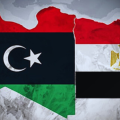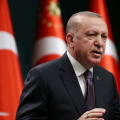Egypt-Turkey rapprochement: A game changer for Libya?

The recent thaw in relations between regional rivals Turkey and Egypt after years of discord opens up important opportunities for cooperation between the two countries in resolving the ongoing conflicts in Libya. Both Ankara and Cairo have cultivated ties and influence amongst opposing factions on the ground in Libya’s multifaceted power struggle. Joint diplomatic efforts by Turkey and Egypt, underpinned by their substantial leverage, could help nudge Libyan groups towards much-needed reconciliation and stability.
Facilitating Libyan Elections
Libya has been gripped by political paralysis and an inability to conduct planned elections to produce an empowered, legitimized government. Turkey aligns itself mostly with the UN-backed administration that was previously based in Tripoli, while Egypt has cultivated closer ties with the eastern-based parliament and forces loyal to military commander Khalifa Haftar.
Leveraging their relationships across Libya’s divides, Turkey and Egypt could work together to convince Libyan groups to negotiate power-sharing arrangements and lay the groundwork for credible national elections. International organizations struggling to mediate reconciliation in Libya would also enthusiastically welcome coordinated diplomatic pressure by these two significant regional stakeholders.
Implementing DDR Initiatives
One of the greatest barriers to resolving Libya’s conflicts is the sheer number of armed militias and powerful mercenary groups that now dominate its security landscape. Experts overwhelmingly agree that any viable settlement necessitates urgent and sweeping disarmament, demobilization and reintegration (DDR) initiatives targeting these extra-state actors. Both Turkey and Egypt have cultivated extensive patronage ties with various militia factions that are currently concentrated in Libya’s western and eastern regions respectively.
Acting jointly, Ankara and Cairo could discreetly apply pressure on some of their loyal armed groups to participate constructively in internationally-backed DDR processes spearheaded by foreign donors and the Libyan authorities. Even symbolic consensus between Turkey and Egypt on the national imperative of DDR would help consolidate disparate efforts and accelerate these vital stabilization initiatives which have previously lagged.
Keep Reading
Unlocking Eastern Mediterranean Prospects
Furthermore, the rapprochement between Turkey and Egypt opens up avenues for de-escalation and mutually beneficial cooperation in the Eastern Mediterranean. This geostrategic maritime region emerged as an explosive flashpoint in recent years, as both countries intensified efforts to counterbalance each other through aggressive maneuvers.
With Ankara and Cairo no longer fundamentally at crossed purposes, the prospects improve markedly for exploring breakthrough joint projects related to offshore energy exploration, upholding freedom of navigation, and collaborating on curbing illegal migration flows from North Africa. Progress on resolving these complex regional issues would also help stabilize Libya itself as well as its adjoining coastal waters.
The Turkey-Egypt thaw after years of estrangement can have profound benefits for conflict mediation and eventual peacebuilding within Libya. Leveraging their unmatched influence as the two most dominant external stakeholders in Libya, Ankara and Cairo would be far better placed to unify, synchronize and optimize their diplomatic pressure when acting in tandem.













